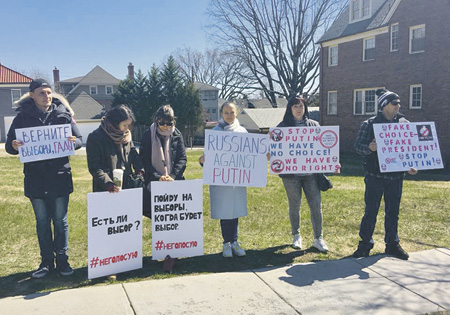
Trump was urged not to believe letters from Russian immigrants in support of Putin
According to Nezavisimaya Gazeta,* a group of Russian immigrants in the U.S. including well-known journalists and cultural figures, sent an open letter to President Donald Trump. The U.S. leader was urged not to respond to the activities of the Congress of Russian Americans.** Representatives of the CRA stated that they represent the interests of 5 million Russian-speaking Americans and that they all supposedly support the policy of Vladimir Putin. Meanwhile, Russian Americans loyal to the Russian authorities are getting ready for a forum at the Russian Embassy in Washington. Their opponents are preparing for a concert in support of the Ukrainian soldiers who were injured in Donbass.
An independent group of Russian-speaking immigrants living in the U.S. stated that they “fully endorse the measures taken by the Trump administration against the Russian ruling elite.” They do not support the actions of the Russian government and President Putin. “We strongly condemn unlawful actions of the Russian government for its various acts of aggression against its neighbors, its shameless interference in political affairs of many countries and its acts of terrorism abroad, especially its recent chemical attack in Salisbury, U.K.,” the document says. Some 144 Russian political immigrants signed this document, among them well-known human rights activists, journalists and cultural and art figures living in the U.S., including journalist Alexander Goldfarb, an expert with the Free Russia Foundation, Andrei Piontkovsky, Lev Deych, a physics professor, Andrei Zagdansky, a documentary filmmaker, and others.*** [http://www.4freerussia.org/russian-americans-say-keep-it-up-president-trump/]
The authors of the letter to Trump, published on the websites of the Atlantic Council of the United States and Free Russia Foundation as well as through other resources, said that it was their reaction to a similar document, sent a few weeks ago to Trump on behalf of the Congress of Russian Americans. The CRA letter, claimed to represent the opinion of 5 million Russian-speaking Americans, denied Russian involvement in the recent poisoning of ex-spy Sergei Skripal and complained that the expulsion of 60 Russian diplomats had complicated their lives and, as a result of the negative image of Russia formed in the U.S. media, Russian-speaking Americans had begun to experience discrimination.
Russian political immigrants living in the United States emphasized that the discrimination members of the CRA are complaining about to Trump is in fact a myth, and that the CRA letter is part of an information campaign by the Kremlin. “The CRA is a pro-Kremlin organization, and their letter addressed to the White House two weeks ago is distributed in the media and social networks with the assistance of the Russian Foreign Ministry and Kremlin-controlled propaganda channels: Sputnik and RT,” according to the Russian immigrants in the U.S. In this way they try to argue that the CRA letter is a part of the information war that the Russian government is waging against the United States.
For example, the Coordinating Council of Russian Compatriots of the U.S. or KSORS is among those who supported the appeal of the CRA to Trump about the lifting of sanctions against Russia. KSORS is actively cooperating with the Russian Embassy in Washington. Moreover, KSORS intends to hold a forum “for the consolidation of compatriots living in the United States” in the near future. It will be held directly on the premises of the Russian Embassy in Washington. However, it seems that not all compatriots will be able to participate. Its website indicates that people between the ages of 18 and 35 are invited to participate, as well as the heads of organizations of Russian compatriots residing in the U.S.
One of the purported participants of this forum, Seattle-based president of the Russian-American Cooperation Initiative Sergey Gladysh, explained the idea behind the event. “The main purpose is to consolidate the Russian-speaking community, exchange ideas and experience of NGOs and projects. Participation is not limited by age, it’s just that young people are separated into their own category, and more simplified application rules apply to them.” Gladysh criticized an open letter from the Kremlin’s opponents to Trump, saying that he “does not understand how you can be pleased with the current state of affairs between the Russian Federation and the United States. “I do not think that this letter is more representative than the CRA appeal,” Gladysh said.
Dmitriy Valuev, a representative of the Free Russia Foundation, whose colleagues regularly picket the Russian embassy in Washington, explained in his interview with Nezavisimaya Gazeta that the information campaign of a number of immigrants who support Putin while enjoying the benefits of the United States “provoked a murmur among the Russian-speaking community.”
“There was a desire to distance ourselves from this CRA statement, where Trump is asked to cancel the sanctions as well as a desire to emphasize that not all Russian speakers support Putin and his policies. So the response letter was a grassroots initiative. Now we are discussing the possibility of open collection of signatures, where everyone can subscribe to on the website,” Valuev said.
Valuev noted that Russian political immigrants living in the U.S. are divided, and therefore structures like KSORS, CRA, etc., are apparently supervised and supported by the Russian authorities. The KSORS conference cheduled for June is not the first event of that kind. Valuev summed it up: “And if Putin’s supporters in the United States consolidate their forces, it is important for us to consolidate our own.” In late April, Russian-speaking communities in the United States will hold a charity concert entitled “Let Us Help Ukraine” in support of soldiers wounded during the military operations in the southeast of Ukraine.
*Editor’s note: Nezavisimaya Gazeta is a Russian daily newspaper.
**The Congress of Russian Americans is a national nongovernmental organization founded in 1973 to promote Russian culture and improve U.S.-Russia relations.
***Andrei Piontkovsky is a Russian scientist and political writer and analyst.

Leave a Reply
You must be logged in to post a comment.